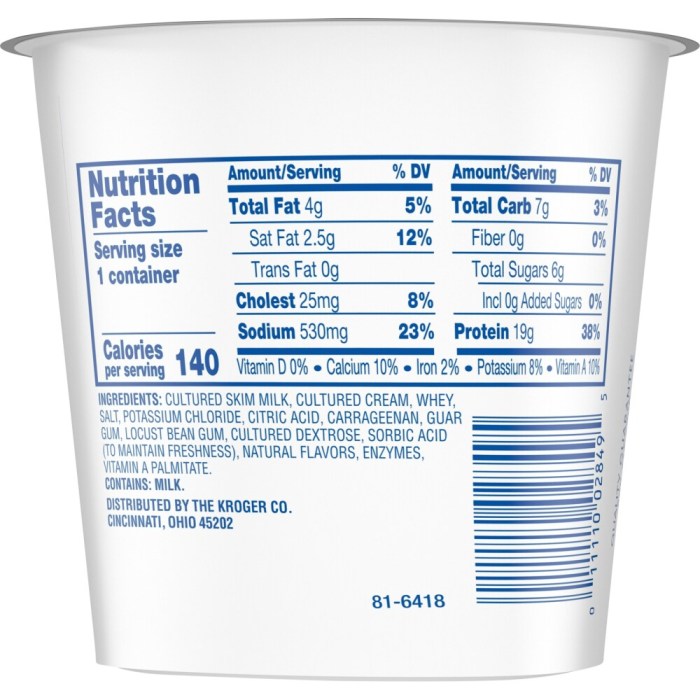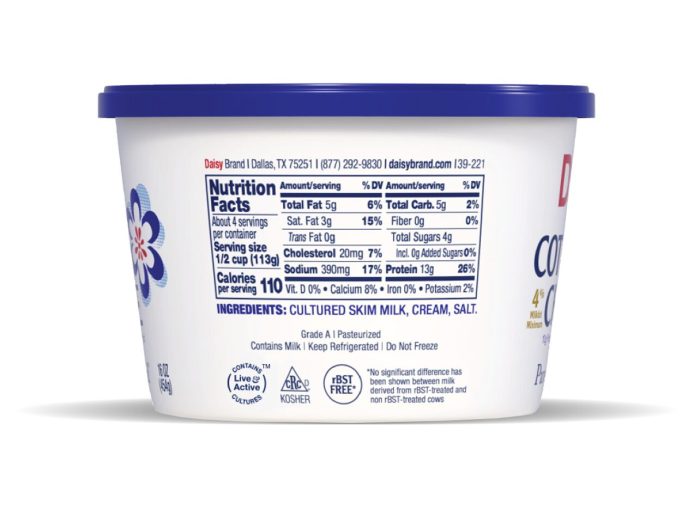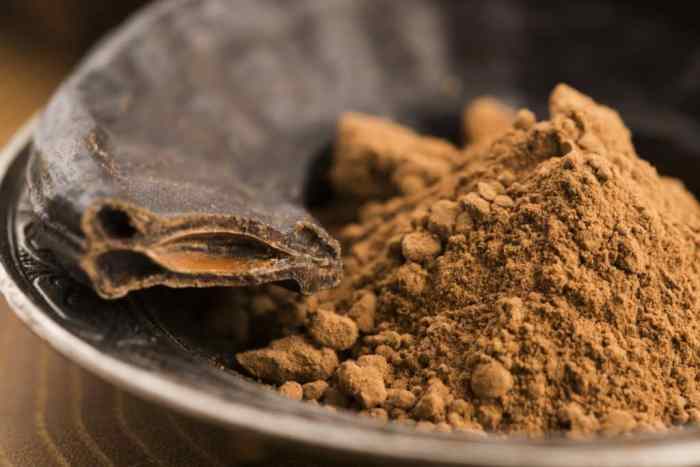Nutritional Profile of Low-Fat Cottage Cheese: Nutrition Facts Cottage Cheese Low Fat

Nutrition facts cottage cheese low fat – Low-fat cottage cheese offers a surprisingly versatile and nutritious option for a healthy diet. Its creamy texture and mild flavor make it a great addition to both sweet and savory dishes, while its nutritional profile supports various health goals. Let’s delve into the specifics.
Macronutrient Breakdown of Low-Fat Cottage Cheese
The macronutrient composition of low-fat cottage cheese varies slightly depending on the brand and specific product, but a typical serving (around 1 cup or 225g) generally provides a good balance of protein, fat, and carbohydrates. Understanding this balance is key to incorporating it effectively into your diet.
| Nutrient | Amount per Serving (approx.) | % Daily Value (approx.) | Health Benefit |
|---|---|---|---|
| Protein | 25-30 grams | 50-60% | Supports muscle growth and repair, promotes satiety. |
| Fat | 2-5 grams | 3-8% | Provides essential fatty acids (though low in this instance, contributing to overall lower calorie count). |
| Carbohydrates | 6-8 grams | 2-3% | Provides energy, with a relatively low impact on blood sugar due to the protein content. |
Micronutrient Content of Low-Fat Cottage Cheese
Beyond the macronutrients, low-fat cottage cheese is a decent source of several essential vitamins and minerals. These contribute to overall health and well-being, enhancing its nutritional value.
Low-fat cottage cheese is a significant source of:
- Calcium: Crucial for strong bones and teeth.
- Riboflavin (Vitamin B2): Important for energy metabolism.
- Vitamin B12: Essential for nerve function and red blood cell formation.
- Selenium: An antioxidant that protects cells from damage.
Comparison to Similar Dairy Products
It’s helpful to compare low-fat cottage cheese to other popular dairy choices to understand its unique position within a healthy eating plan. This comparison highlights its strengths and weaknesses relative to similar options.
Low-fat cottage cheese offers a relatively high protein, low-fat nutritional profile, contrasting sharply with the high-calorie, high-fat content of many processed foods. A comparison to the caloric density of other condiments, such as the significant fat and sodium content found in nutrition facts big mac sauce , highlights the stark differences in macronutrient composition. Therefore, dietary choices emphasizing low-fat cottage cheese contribute to a healthier nutritional balance than those including high-fat sauces.
| Nutrient | Low-Fat Cottage Cheese (per cup) | Greek Yogurt (plain, nonfat, per cup) | Skim Milk (per cup) |
|---|---|---|---|
| Protein (grams) | 25-30 | 20-25 | 8-10 |
| Fat (grams) | 2-5 | 0-2 | 0 |
| Carbohydrates (grams) | 6-8 | 5-10 | 12-13 |
| Calcium (mg) | 200-300 | 200-300 | 300-350 |
Comparison with Full-Fat Cottage Cheese

Let’s delve into the differences between low-fat and full-fat cottage cheese. While both offer protein and calcium, their nutritional profiles diverge significantly, impacting their suitability for various dietary needs. Understanding these differences can help you make informed choices about which type best aligns with your health goals.Choosing between low-fat and full-fat cottage cheese involves weighing the benefits and drawbacks of each.
The decision depends heavily on individual dietary preferences and health objectives. We’ll explore the nutritional contrasts, potential health implications, and sensory experiences associated with each option.
Nutritional Profile Comparison
The following table summarizes the key nutritional differences between low-fat and full-fat cottage cheese, based on typical serving sizes (approximately 1 cup or 227g). Keep in mind that exact values can vary slightly depending on the brand and manufacturing process.
| Nutrient | Low-Fat Cottage Cheese (approx. values) | Full-Fat Cottage Cheese (approx. values) |
|---|---|---|
| Calories | ~170 | ~280 |
| Fat (grams) | ~0.5 – 2 | ~10 – 12 |
| Saturated Fat (grams) | ~0.2 – 0.8 | ~6 – 7 |
| Protein (grams) | ~28 | ~25-28 |
| Carbohydrates (grams) | ~6 | ~6 |
| Calcium (mg) | ~200-300 | ~200-300 |
Implications for Different Dietary Goals, Nutrition facts cottage cheese low fat
Individuals following a low-fat diet, often for weight management or cardiovascular health, might opt for low-fat cottage cheese due to its significantly reduced calorie and fat content. Conversely, those seeking a higher-fat intake, possibly adhering to a ketogenic diet or prioritizing satiety, might prefer full-fat cottage cheese. The higher fat content contributes to increased satiety, meaning you feel fuller for longer.
However, the higher calorie and saturated fat content in full-fat cottage cheese should be considered carefully by individuals with specific health concerns. For example, someone with high cholesterol might need to limit their saturated fat intake, making low-fat cottage cheese a more suitable choice.
Benefits and Drawbacks of Each Type
Low-fat cottage cheese offers a lower calorie and fat option, making it suitable for weight management. However, some individuals find its taste and texture less creamy and satisfying compared to the full-fat variety. The reduced fat content might also mean a slightly less satiating effect.Full-fat cottage cheese boasts a richer, creamier taste and texture, often leading to greater satiety due to its higher fat content.
This can be advantageous for those seeking to curb appetite and maintain fullness between meals. However, the higher calorie and saturated fat content are potential drawbacks for individuals concerned about weight management or cardiovascular health. The increased richness might also not appeal to everyone.
FAQ Compilation
Is low-fat cottage cheese a good source of calcium?
Yes, low-fat cottage cheese is a good source of calcium, contributing to bone health.
Does low-fat cottage cheese contain probiotics?
The probiotic content varies depending on the brand and processing; check the label for specific information.
Can I freeze low-fat cottage cheese?
While freezing is possible, it can affect the texture. It’s best to use it within a few months of freezing.
How long does low-fat cottage cheese last in the refrigerator?
Low-fat cottage cheese typically lasts for 7-10 days in the refrigerator once opened, provided it is stored properly.








